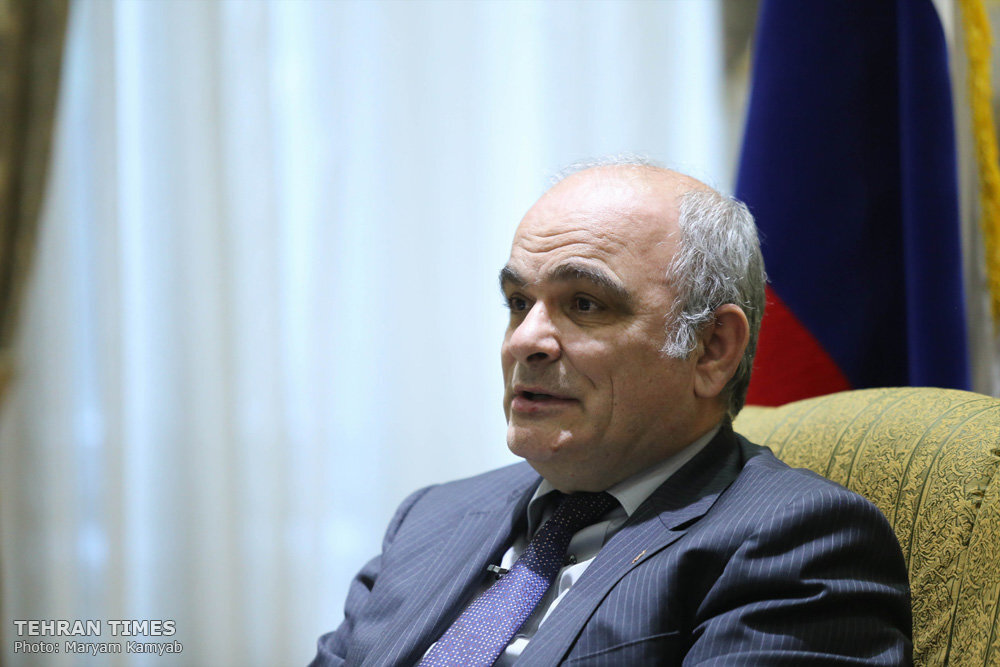Russian diplomat says Iran’s reducing nuclear commitments has been a ‘forced measure’

Levan Dzhagaryan, the Russian ambassador to Tehran, has said that Iran’s five steps to reduce its nuclear commitments under the 2015 nuclear deal, known as the JCPOA, were a “forced measure”.
“The United States has blatantly violated its commitments and international law, namely the UN Security Council Resolution 2231, and then started to baselessly accusing Iran of all problems,” TASS quoted him as saying on Tuesday.
“For today, Iran remains the most verifiable state in the world, and the IAEA [International Atomic Energy Agency] has repeatedly underscored the country’s commitment to its obligations [under the nuclear deal],” he said.
He added, “Russia is not happy about the measures taken by Iran, but we understand that they were forced to do so. Moreover, all those measures are reversible.”
He also said that Russia is alarmed by Iran’s declared possibility of withdrawal from the nuclear Non-Proliferation Treaty(NPT) in response to European states’ conduct.
“We are very alarmed by this issue, including by the fact that it was raised at the Majlis [the Iranian parliament],” he said. “To a significant extent, such an emotional reaction on behalf of our Iranian colleagues can be explained by the fact that Tehran had been honoring its obligations under the nuclear deal for quite a while. At the same time, the trio of European powers (the United Kingdom, Germany and France) was only making declarations.”
According to the diplomat, Russia has repeatedly urged Iran “to remain committed to NPT provisions and to remain a part of this very important international treaty.”
Foreign Minister Mohammad Javad Zarif has warned that Iran will consider quitting the NPT if the Europeans refer Iran’s nuclear case to the UN Security Council.
“If they (Europeans) take any action, the issue of quitting the NPT will be raised based on the letter of the President dating May 2018,” Zarif told ICANA in an interview published on January 20.
The Majlis National Security and Foreign Policy Committee has received a plan to study Iran’s possible withdrawal from the NPT.
The plan has so far been signed by 19 MPs, ISNA reported on Saturday.
The Iranian government is duty bound to immediately quit the NPT and stop all cooperation with the International Atomic Energy Agency if Iran’s nuclear case is referred to the United Nations Security Council, the MPs said in their letter to the parliament speaker.
France, Germany and the United Kingdom, the three European states signatory to the JCPOA, issued a joint statement on January 14, announcing they have formally triggered the dispute mechanism which could bring the issue before the UN Security Council.
The EU’s foreign policy chief Josep Borrell said on January 24 that he had extended the time available to discuss ways to save the nuclear deal with Iran under the dispute mechanism triggered by the three European Union trio, also referred to as E3.
“There is agreement that more time is needed due to the complexity of the issues involved. The timeline is therefore extended,” Borrell said in a statement.
Borrell said the joint commission that regulates the Iran nuclear deal will meet in February but did not give a date.
He has said that the EU will extend indefinitely the time limit to resolve disputes in the 2015 nuclear deal to avoid having to go to the UN Security Council or triggering new sanctions.
“We are in agreement not to go directly to a strict time limit which would oblige (us) to go to the Security Council,” Reuters quoted him as saying during a visit to Tehran on Monday.
‘Russia, Iran played key effort in countering terrorists in Syria’
Dzhagaryan also said that Russia and Iran have played a key role in preventing terrorists from establishing their rule in Syria.
“If not for Russia and Iran, terrorists would have already won in Syria,” he said. “Thanks to our efforts, the legitimate government of [President] Bashar Assad is now in power. Even our adversaries admit it, albeit reluctantly.”
According to the Russian diplomat, Russian-Iranian relations have also been on the rise in past years.
“This is mostly due to the fact that on many issues our positions are either close or overlapping. Syria has become one of cooperation areas that has proven its efficiency,” he added.
“Fighting terrorism is a common challenge for Iran and Russia,” the ambassador continued. “We also have common goals and tasks regarding other regional problems. Besides, our countries are under Western sanctions. This certainly makes us closer.”
NA/PA
